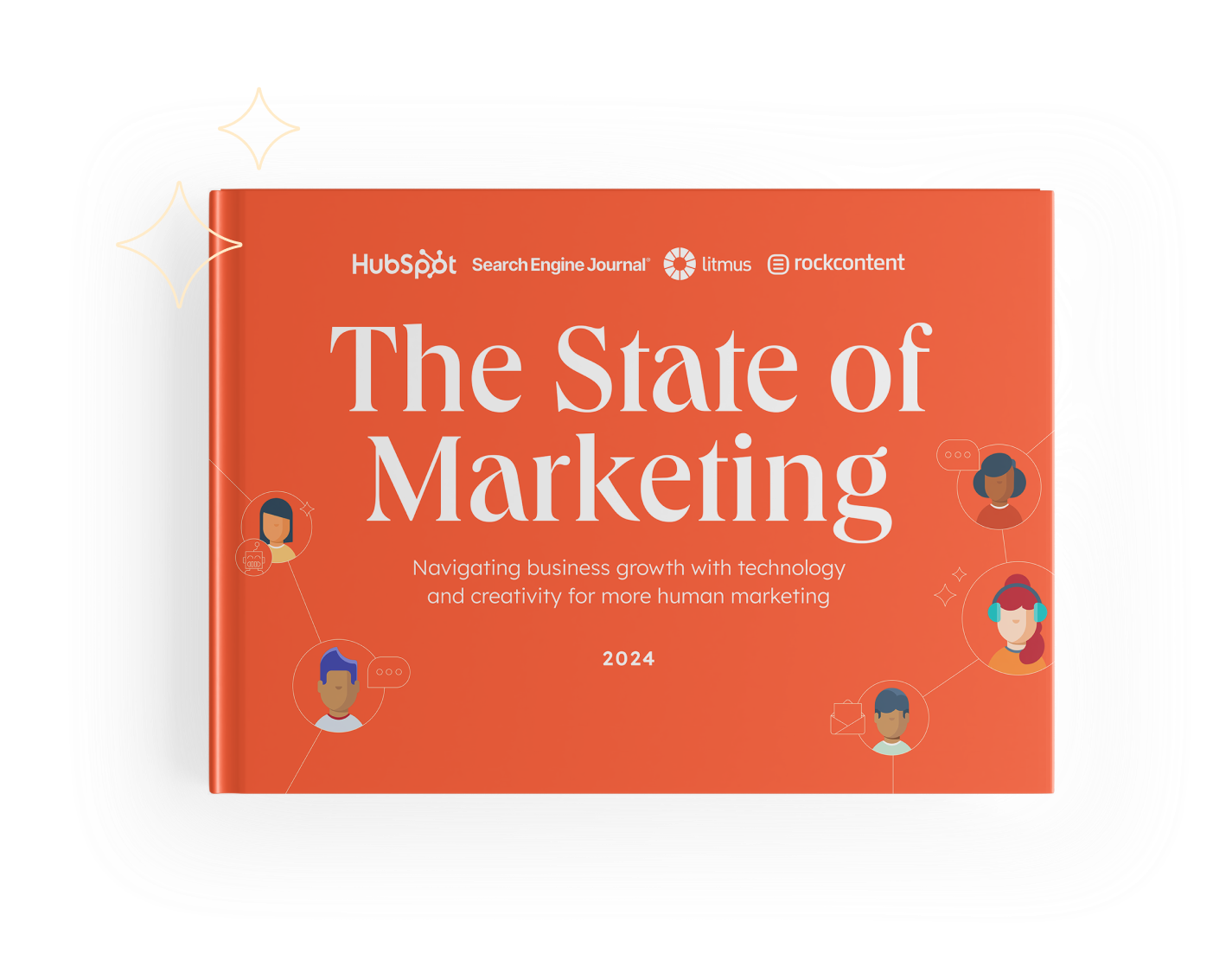Welcome to HubSpot's Expert Edge Series, where we interview top execs at major brands to explore their perspectives on the latest trends, challenges, and opportunities shaping the industry.

"Use AI. But not too much AI … and in the right ways."
"Optimize for SEO – but it's changing completely and irrevocably, so also optimize for other channels."
"Speed and relevancy are top priorities. But we also need a 3-6 month content calendar which will require rallying a cross-functional team."
Sound familiar?
These are just a few of the six paradoxes Jasper's Head of Enterprise Marketing and Communications, Samyutha Reddy, recently posted on her LinkedIn:
I'm willing to bet her thoughts resonate with plenty of marketers. 2024 has already felt like a consistently-shifting video game with plenty of unexpected pitfalls, cliffs, and trap doors.
As everything about marketing changes — from SEO to content creation to goal-setting — Reddy encourages marketers to stay focused on what matters: Storytelling.
Here, let's dive into some of her tips for dealing with the mixed messages we're hearing in 2024, and what to stay focused on, instead.
Why These Six Paradoxes Exist in The First Place
First, I was curious if Reddy had an assumption about why these paradoxes exist in 2024.
Why is this year so challenging for marketers? Is it AI? Google's upcoming SGE changes? Something else?
Surprisingly, Reddy doesn't believe these paradoxes are new to the world of marketing.
As she told me, "There is always a pendulum swing in marketing tactics and the industry being quick to adopt it, then swinging the other way once it shows diminishing returns. A couple of examples of this includes our reliance on paid ads, where the biggest budgets determined who the industry leaders were, but the efficiency of that ad spend has now been called into question. So we shifted to content, and it was about who had the capacity to create the most content possible, and those tech companies that behaved like media companies took the market share."
HubSpot uses the information you provide to us to contact you about our relevant content, products, and services. HubSpot will share the information you provide to us with the following partners, who will use your information for similar purposes: Search Engine Journal, Litmus, Rock Content. You can unsubscribe from communications from HubSpot at any time. For more information, check out HubSpot's Privacy Policy. To unsubscribe from Search Engine Journal's communications, see Search Engine Journal's Privacy Policy. To unsubscribe from Litmus's communications, see Litmus's Privacy Policy. To unsubscribe from Rock Content's communications, see Rock Content's Privacy Policy.

The State of Marketing in 2024
HubSpot's Annual Inbound Marketing Trends Report
-
Top Marketing Channels
-
AI in Marketing
-
Managing Privacy
-
The Future of Marketing
She continues, "Then, we had diminishing returns on that tactic as well. We were spending so much time on the content treadmill and short-changed critical aspects of content creation like distribution strategy and message pull through."
Which leads me to wonder: Where is the pendulum swing heading next?
Reddy says, "With AI coming into play, the pendulum is again swinging away from traditional content creation tactics. In my opinion, the big swing is headed squarely toward organizations recognizing the importance of consistent storytelling across their brand with relevant spokespeople dedicated to each niche of their audience. In my opinion, the companies that are telling the most impactful stories to their target audience through the voice of relevant spokespeople will rise to the top of the leaderboard in today’s marketing landscape."
Why Brand Is Crucial to the Future of Marketing
Reddy believes that the challenges marketers are facing signify a need for a philosophy shift.
For so long, marketers have gotten excited about tactics and technology. But Reddy believes that in that frenzy, many of us have forgotten why marketing matters: Storytelling.
"We all started focusing too much on tactics, and not enough on messaging. In B2B, I think we've long discounted brand narrative and become hyper-focused on measuring ROI. But what I'd argue is that brand is increasingly important in soft macro-environments like the ones we're seeing. When people have limited money to spend, they spend it most where they have relationships and loyalty and brand respect."

The concept of brand isn't new in the B2C space — in fact, it largely drives it.
Consider Apple: At its core, it's a technology company. But it excels because of its brand, which represents leadership, creativity, and innovation.
Now, Reddy believes B2B companies need to begin valuing brand in the same way as B2C.
"Ironically, I think brand marketing needs a rebrand. And we need to shift from brand marketing being a nice-to-have when there’s extra budget to brand building as an essential part of a growth strategy," She told me.
Reddy continues, "Brand is inextricably linked with growth, and we've spent way too long in marketing splitting those two up. While they have different measurement tactics, they ultimately need to ladder up into the same revenue number and impact one another. The sharp focus on a company’s strategic narrative and the storytelling around its product roadmap is the key to connecting them. "
Reddy acknowledges that the shift to thinking about brand isn‘t an easy one. "Brand" can be difficult to measure, and it’s not easy to point to immediate ROI and say, "See that? That's because of the effort we put into brand-related initiatives!"
In a year where marketers are focused on in-the-weeds, revenue-driving activities, it requires a philosophical shift to think big picture about how your brand is perceived.
But, as Reddy puts it: "If you don't have a strong brand that’s represented in the minds of your prospects, whether or not they’re ready to buy, you open yourself up to too much risk. Especially with how unpredictable SEO is and will continue to be. Brands are losing out on critical traffic to long-held search terms overnight with the advent of Google’s SGE and the introduction of Google perspectives."
She adds, "Without a strong brand and without the guarantee of traffic from a keyword search, if you're not coming up first in search terms, you've lost that lead, and you've lost the potential from that interaction."
Vulnerability is Central to A Brand's Success
Reddy believes the future of storytelling lies in the hands of people — not brands.
"We’ve been preaching for a long time that people buy from people, they don’t buy from companies, but B2B has been slow to practice what we preach."
She points to Dave Gerhardt as an example of a successful brand who’s story is being told through its founder. A previous VP of Marketing at Drift and CMO at Privy, he's now founder and CEO of Exit Five, a media company focused on B2B marketers.
Reddy says that Gerhardt often "builds in public", sharing his thoughts on the economics of his business and why he’s opting to create new offerings, just as much as he talks about his commentary on the industry.
In this way, his prospects feel like they know him personally and his vulnerability with them has built inherent trust that extends to the products he sells.
Reddy's concern is that its a small segment of the Marketing-first CEOs, founders, or VC partners who are embracing this opportunity to tell stories about their brands via their personal profiles.
At Jasper, Reddy leverages specific spokespeople to tell stories based on their experience and relevancy to an audience, and it's not a one-size-fits-all approach.
For example, she’ll have the CEO or President talk to reporters about the changing landscape in enterprise technology as it relates to AI and their take on the shift in marketing organizations.
She then looks to marketing leadership to tell a more in-depth story about how marketing structures are changing, and the emotions marketers are experiencing with the shifts that have accompanied AI.
Finally, she turns to Jasper customers to tell their story on how they champion AI within their organizations, the pilot programs they’ve built, and how taking initiative around AI has impacted their careers.
As she puts it, "Rather than having the Jasper branded handle talk about these issues — which dulls the impact when it comes from a generic talking head — you want these stories to come from people who are putting their careers and reputation on the line to tell you their perspectives."
While Reddy is bullish on executives telling the company story through their own voices, it’s also the part of Marketing and Communications that proves to be the toughest in some scenarios.
In fact — it's the paradox she's struggling with most right now.
"I feel like I can spot an executive who has a social media person or agency create their content in a second. And that one interaction of knowing that executive didn't draft his or her own content makes me lose trust immediately."
She adds, "Vulnerability is critical to brand success. The toughest part is getting executives to offer up their own vulnerability as part of that brand. You can't protect yourself from all risk, all of the time. And that’s an important balance to maintain as a Communications leader. The brands that protect themselves and the executives that are risk-averse and don't want to say anything for the risk of saying the wrong thing, are the brands that are disappearing into the abyss and should be the most nervous about the changes AI is bringing to the marketing landscape."

At HubSpot, we've figured this out on our own social channels. After our social team shifted to a personality-driven approach over a corporate approach, they saw astronomical returns.
Because people want to hear from other people: Even when those people (especially when those people) don't have the perfect answers.
As Reddy puts it, "A lot of CEOs believe storytelling isn’t a core part of their job, especially when it comes to doing that publicly on social media. But the company strategy is the company story, and many CEOs don’t see how integral it is to connect those dots and tell that story internally and externally. It’s why a strong marketing and communications leader is so important to an organization, and why their relationship with the CEO is critical to the brand’s success."
Marketing Isn't Doomsday — It’s a Time of More Opportunity Than Ever
Finally, I asked Reddy if she ever feels concerned over all these mixed messages.
Should marketers fear for their roles? Should they believe that the future of marketing lies in AI and YouTube and influencers, and that soon, there will be no place left for them?
She acknowledges that many marketers are scared and frustrated right now with the state of marketing, as well as the macro employment market. However, she chooses to reframe this fear into opportunity for her fellow marketers.

"In the age of AI, marketers are the stewards of AI within the enterprise. We are the ones that have the most to gain from the state that AI is in right now because we create the most content in the enterprise. We get to experiment with tools and advise our organizations on technology and AI decisions in a way that our department never has before. "
She adds, "So, in that way, I don't see marketing right now as this 'doomsday'. It's a tough time to be here, but there's also more opportunity than ever before. I mean, we're seeing CMOs being invited to the table in a way we've never seen before, with CTOs saying, 'How are you thinking about AI? Your team has experimented the most with AI. Advise me on technology decisions.'"
"I'm also seeing mid-career marketers elevate their careers tenfold by leading the charge on forming things like AI Councils that govern usage of AI within their organizations and reach visibility with executive leadership teams in a really impactful way."
"Marketers aren't the side story right now," She concludes. "Marketers are the main characters."
![Download Now: Free State of Marketing Report [Updated for 2024]](https://no-cache.hubspot.com/cta/default/53/db725f24-564c-483b-a28c-2d6ff9986516.png)




![11 Recommendations for Marketers in 2024 [New Data]](https://blog.hubspot.com/hubfs/Marketing%20Recommendations.png)
![The Top 5 B2C Marketing Trends of 2024 [New HubSpot Blog Data + Expert Insights]](https://blog.hubspot.com/hubfs/top%20b2c%20marketing%20trends.png)
![5 Marketing Trends That Might Not Survive in 2024 [HubSpot Research + Expert Insights]](https://blog.hubspot.com/hubfs/marketing%20trends%20that%20might%20not%20survive%202024.png)


